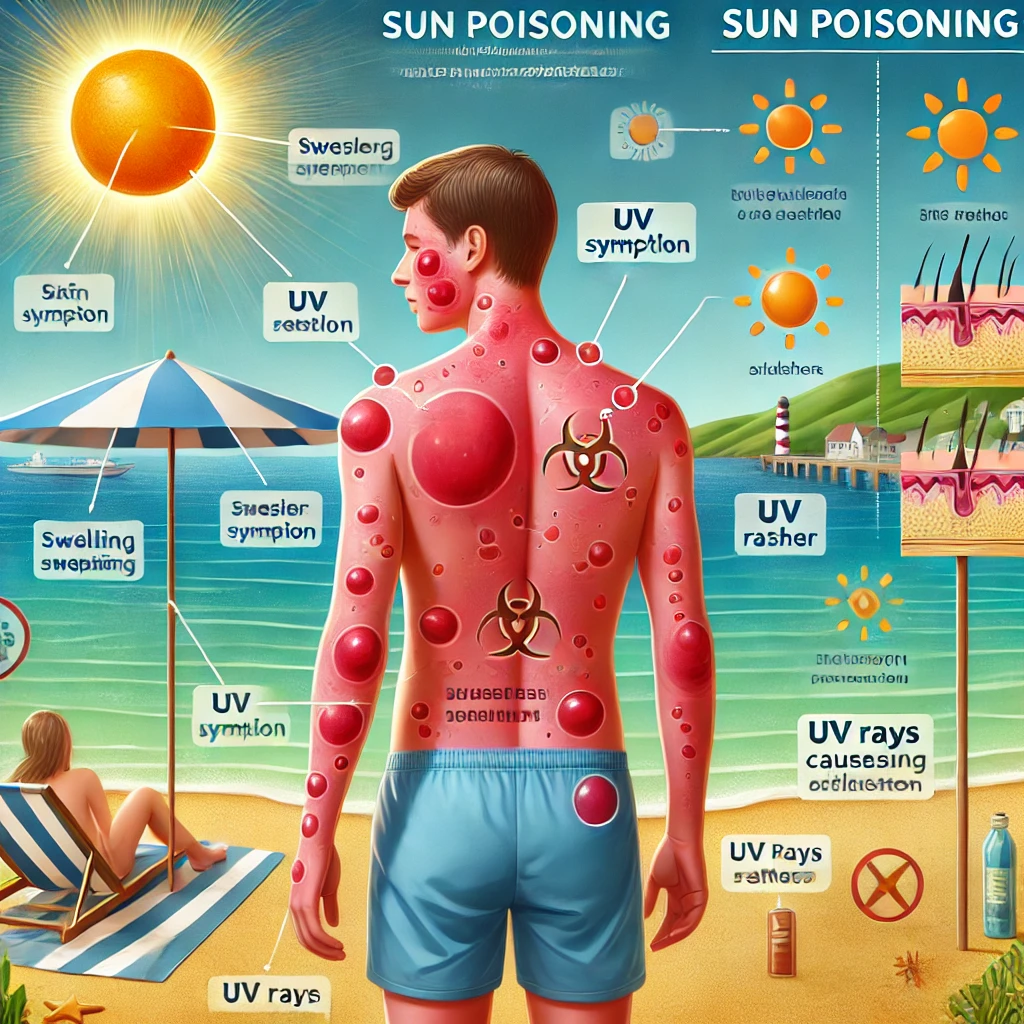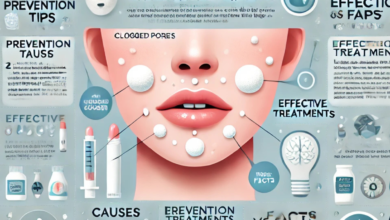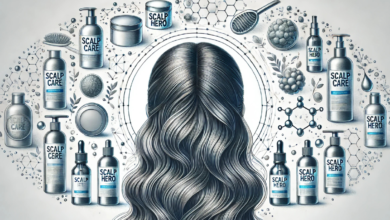Sun Poisoning: Understanding, Preventing, and Treating Severe Sunburns

Sun poisoning is a serious condition caused by excessive sun exposure. It causes severe sunburn and a range of distressing symptoms. Unlike a typical sunburn, sun poisoning can lead to blistering, fever, dehydration, and even hospitalization in extreme cases. In this article, we will explore sun poisoning, its causes, symptoms, prevention tips, treatments, and long-term effects. Understanding sun poisoning is crucial for protecting your skin and overall health when spending time outdoors in the sun.
Introduction to Sun Poisoning
Sun poisoning is a severe reaction to sun exposure that extends beyond a simple sunburn. It involves intense damage to the skin caused by ultraviolet (UV) radiation, leading to symptoms such as blistering and swelling and sometimes systemic reactions like nausea, fever, and dehydration. While sunburn is common and usually mild, sun poisoning is an extreme form of sunburn that can cause lasting skin damage and other health issues.
The term “sun poisoning” is often used to describe the combination of severe sunburn with flu-like symptoms. Sun poisoning is most commonly seen in individuals exposed to intense sunlight for extended periods without proper protection. It is also more likely to occur in people with fair skin or certain medical conditions, making them more susceptible to UV damage. While the effects of sunburn are usually temporary, sun poisoning can have more lasting consequences if not treated properly.
Understanding the difference between regular sunburn and sun poisoning is essential for recognizing the severity of the condition and taking appropriate measures to prevent and treat it. Sun poisoning can be dangerous and should never be ignored, as it can lead to complications if left untreated. The first step in preventing sun poisoning is learning to protect yourself from the sun’s harmful rays.
Causes and Risk Factors
Sun poisoning occurs when the skin is exposed to excessive ultraviolet (UV) rays, particularly UVB rays, which are known for causing the most damage. These rays penetrate the skin’s layers, damaging the skin cells and causing inflammation, redness, and peeling. Sun poisoning can lead to blistering, fever, and systemic symptoms in severe cases. The intensity of UV rays is strongest between 10 a.m. and 4 p.m., making this the highest-risk period for sun exposure.
Certain factors can increase the risk of developing sun poisoning. People with fair or light skin are more vulnerable to UV damage because they have less melanin, the pigment that provides some protection against the sun’s rays. Additionally, individuals who spend long hours outdoors, such as athletes, gardeners, or outdoor workers, are at higher risk of sun poisoning due to prolonged exposure. Those with certain medications, like antibiotics or antihistamines, may also be more prone to sunburns and sun poisoning, as these drugs can make the skin more sensitive to sunlight.
Other health conditions, such as lupus or other autoimmune diseases, can increase the risk of sun poisoning. These conditions can impair the body’s ability to repair UV-induced skin damage, making the skin more susceptible to severe reactions. It’s also important to note that medications like birth control pills and certain chemotherapy drugs can increase sun sensitivity, further raising the risk of sun poisoning. Wearing sunscreen and protective clothing, avoiding peak sun hours, and staying hydrated are critical steps in minimizing the risk.
Symptoms of Sun Poisoning
The symptoms of sun poisoning can vary depending on the severity of the exposure. Mild cases may present with symptoms similar to a typical sunburn, such as red, tender skin that is hot to the touch. However, more severe cases can cause blistering, swelling, and intense pain. People with sun poisoning often experience systemic symptoms such as nausea, chills, dizziness, and fatigue, making the condition feel more like the flu rather than a simple sunburn.
In addition to the visible effects on the skin, sun poisoning can cause severe dehydration due to fluid loss through sweating, fever, and blistering. Dehydration can lead to headaches, dry mouth, dizziness, and confusion, making it essential to drink plenty of fluids to restore hydration. In extreme cases, the systemic symptoms of sun poisoning can lead to hospitalization, particularly if the individual is unable to keep fluids down or experiences an overwhelming immune response.
Other symptoms of sun poisoning include fever, swollen lymph nodes, and redness or swelling in areas of the skin that were exposed to sunlight. People with sun poisoning may also experience a heightened sensitivity to light, making it painful to look at bright lights or be outdoors. It’s important to monitor these symptoms carefully and seek medical attention if any signs of severe sun poisoning occur, such as blistering, intense pain, or systemic flu-like symptoms.
Prevention: How to Protect Yourself from Sun Poisoning
Prevention is key regarding sun poisoning, as the condition is largely avoidable with the right precautions. The first and most important step in protecting yourself from sun poisoning is to wear sunscreen with a high SPF. Dermatologists recommend using a broad-spectrum sunscreen with an SPF of at least 30, which can help block harmful UVA and UVB rays. Apply sunscreen generously and reapply it frequently every two hours or more if swimming or sweating.
In addition to sunscreen, wearing protective clothing, such as hats with wide brims, long-sleeved shirts, and sunglasses, can help minimize direct sun exposure. A hat can shade your face and neck, while sunglasses protect your eyes from harmful UV rays. For outdoor activities, choose lightweight and breathable fabrics that offer coverage without causing overheating.
Another key strategy is to avoid spending long periods in direct sunlight during peak UV hours, typically between 10 a.m. and 4 p.m. If you must be outdoors during these hours, seek shade whenever possible. Carrying an umbrella or using a sun shelter can also offer additional protection. Drinking plenty of water is essential for staying hydrated and preventing sunburn-induced dehydration, which can lead to sun poisoning.
Treatment of Sun Poisoning

If you or someone you know experiences sun poisoning, the first step is to move to a cooler environment and stay out of the sun. Apply cool compresses to the affected areas of the skin to relieve pain and reduce inflammation. Over-the-counter hydrocortisone cream or aloe vera gel can also help soothe the skin and reduce redness. Stay well-hydrated by drinking plenty of water, as dehydration is a common side effect of sun poisoning.
For more severe cases, especially those with blistering or systemic symptoms, it’s important to seek medical attention. A healthcare professional may recommend pain relievers such as ibuprofen or acetaminophen to manage discomfort and reduce inflammation. In extreme cases where there is a risk of dehydration or infection, hospitalization may be necessary for intravenous fluids and monitoring. A doctor may prescribe antibiotics to prevent infection for blistering or broken skin.
While home remedies can provide some relief, monitoring the condition closely is essential. Visiting a healthcare provider is crucial if symptoms such as persistent fever, extreme fatigue, or widespread blisters occur. Sometimes, prescription-strength medications or specialized treatments may be required to speed healing and reduce the risk of complications.
Long-Term Effects of Sun Poisoning
Repeated sun poisoning can have lasting effects on the skin and overall health. One of the most concerning long-term consequences is an increased risk of skin cancer, particularly melanoma, which is the deadliest form of skin cancer. Prolonged exposure to UV radiation damages the DNA in skin cells, leading to mutations that can result in cancerous growth. The more often an individual experiences severe sunburns or sun poisoning, the higher their risk of developing skin cancer later in life.
Sun poisoning can also accelerate the skin’s ageing process, leading to premature wrinkles, sun spots, and loss of elasticity. Over time, repeated sunburns can cause permanent changes to the skin, including thickening and scarring. This underscores the importance of practising sun safety measures, even if you don’t experience immediate symptoms after sun exposure.
In addition to skin health, sun poisoning can have other long-term effects, such as weakening the immune system. Repeated UV exposure can suppress the body’s immune response to sunburn, making fighting infections and illnesses harder. Taking proactive measures to prevent sun poisoning can help protect your skin and overall well-being in the long run.
Conclusion
Sun poisoning is a severe and potentially dangerous condition that results from excessive exposure to the sun’s harmful UV rays. Understanding the causes, symptoms, prevention methods, and treatment options for sun poisoning is crucial for maintaining healthy skin and preventing long-term damage. By taking the necessary precautions, such as applying sunscreen, wearing protective clothing, and avoiding peak sun hours, you can reduce your risk of sun poisoning and other sun-related health issues. If you experience sun poisoning symptoms, seeking medical treatment and staying hydrated for a speedy recovery is important.
Frequently Asked Questions (FAQs)
- What is the difference between sunburn and sun poisoning? Sunburn is a mild to moderate skin reaction to UV exposure, while sun poisoning is a more severe form of sunburn that can cause blistering, fever, and systemic symptoms.
- How long does it take for sun poisoning to go away? The symptoms of sun poisoning can take several days to weeks to heal, depending on the severity. Mild cases may improve within a few days, while more severe cases may take longer.
- Can sun poisoning cause permanent damage to the skin? Yes, repeated sun poisoning can increase the risk of permanent skin damage, such as premature ageing, scarring, and an increased risk of skin cancer.
- What are the best sunscreens for preventing sun poisoning? Choose a broad-spectrum sunscreen with an SPF of 30 or higher. Look for water-resistant options for outdoor activities, and make sure to apply it liberally.
- Can you get sun poisoning even on cloudy days? Yes, UV rays can penetrate through clouds, so it is still possible to get sunburned or poisoned even when the sky is overcast.
You May Also Read: https://ventsbuz.com/scalp-hero-reviews/


